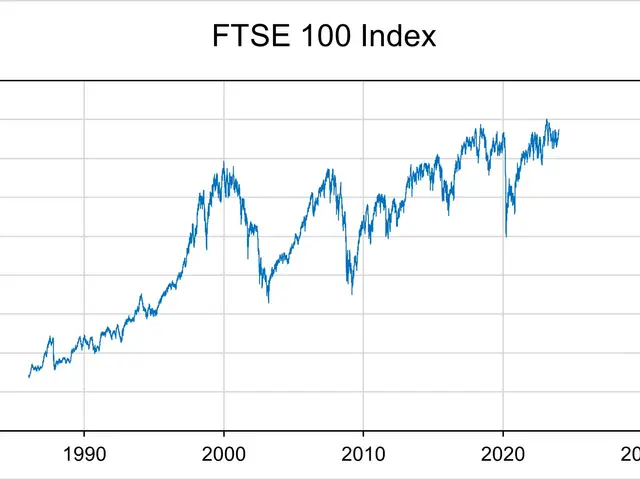AI Stock Comparison: Palantir Technologies vs. Microsoft's AI Potential
AI is revolutionizing industries left and right, and businesses are pouring money into staying ahead of the curve. Compared to traditional labor, AI-powered software can handle mundane tasks efficiently, while making knowledge workers more productive. Decision-makers can sift through relevant data points at a faster pace, leading to better decisions.
The enterprise AI software market is on a roll, expected to grow from $98 billion in 2024 to $391 billion by 2030, according to ABI Research. Generative AI solutions like AI agents are the real growth drivers, predicted to expand even faster. Amid this bull market, two companies stand out: Palantir Technologies (PLTR 8.31%) and Microsoft (MSFT 2.58%).
Both stocks have seen impressive gains, but a recent pullback might just present a buying opportunity. So, which AI stock is the smarter bet right now?
Palantir: Accelerating growth with AIP
Palantir produces software that aggregates data from an enterprise's operations and presents actionable insights to users. The introduction of its Artificial Intelligence Platform (AIP) has been a game-changer, as users can now interact with the software using natural language, thanks to large language models. This has fueled an increase in Palantir's performance over the last two years.
Palantir experienced a 29% revenue growth in 2024, with its adjusted operating margin expanding to 39% from 24% the previous year. The fourth quarter saw both revenue growth (36%) and profitability (45% margin). Management anticipates revenue growth of 31% and an adjusted operating margin of 42% for 2025.
As a software company, Palantir benefits significantly from scale, with minimal marginal costs. CEO Alex Karp has a product-first approach that focuses on creating a top-tier product for select clients with deep pockets. As the product improves and new features are added, it becomes more appealing to a broader group of businesses. AIP has played a key role in expanding the software's usefulness for various businesses.
Palantir operates in two segments: government and commercial. It started by addressing challenges faced by the US military, and its government platform still makes up the majority of its revenue. Government contracts are generally sticky, ensuring a stable revenue stream for Palantir.
However, political tensions and potential budget cuts could impact Palantir's largest revenue source. The federal government is facing steep budget cuts, which might affect Palantir's business. On the other hand, increased efficiency offered by its software might lead to more demand if the military reduces staff.
The triumph of Palantir lies outside government contracts. Its recent AIPCon showcased new commercial clients from around the world, indicating that commercial clients could help Palantir maintain strong revenue growth and expand its operating margin.
The drawback for Palantir stock is its lofty valuation. Even after the recent sell-off, shares trade for over 70 times its 2024 revenue, with a price of 55 times its projected sales for 2025. With such a premium valuation, only a select few stocks have traded at such levels, and history has not been kind to them.
Microsoft: AI leader in cloud computing and enterprise software
Microsoft shoved itself to the forefront of the AI discussion by investing $10 billion in OpenAI in early 2023. Since then, Microsoft has established itself as a frontrunner in two key areas of the growing AI market: cloud computing and enterprise software.
Microsoft's cloud computing platform, Azure, has witnessed impressive growth, as businesses migrate to access compute and foundational models on the cloud to develop new AI solutions or AI-powered products. Management reported a 157% year-over-year growth in AI services revenue on Azure, contributing to a 31% overall growth in the cloud computing segment in the most recent quarter.
Demand for AI services on Azure outpaced supply, suggesting the potential for faster growth in the future. Microsoft is investing heavily to capitalize on the opportunity, with $80 billion set aside for capital expenditures this year, primarily on AI data centers. This growing expenditure supports both the demand for Azure and Microsoft's own AI development.
To take advantage of the AI opportunity, Microsoft developed a line of AI assistants, called Copilot, for use across various software platforms, such as Github, Microsoft 365, and Dynamics 365. A stand-alone Copilot app is also available. Businesses can use Microsoft's Copilot Studio to create their own AI agents to automate tasks and surface useful insights, leading to increasing revenue and expanding margins for Microsoft's Productivity and Business Processes segment.
Microsoft may not be expanding as rapidly as Palantir, but its stock is valued reasonably given the substantial growth it provides. You can pick up shares for less than 11 times its trailing sales. While its P/E ratio isn't particularly cheap at 29 times next year's earnings, it's below its average multiple since the start of 2021. A company with leadership in AI on two fronts merits a premium, and the current price is attractive for the growth it offers.
Microsoft appears to be the savvier investment choice after the recent sell-off in both stocks.
- With an expected growth from $98 billion to $391 billion by 2030, the enterprise AI software market presents a lucrative investment opportunity, particularly with the AI agents being the growth drivers.
- Palantir Technologies, reporting a 29% revenue growth in 2024 and a 31% growth anticipated for 2025, is making strides in the market, with its Artificial Intelligence Platform (AIP) being a game-changer due to natural language interactions enabled by large language models.
- Microsoft, on the other hand, leads in two key AI market areas: cloud computing and enterprise software, with a significant 157% year-over-year growth in AI services revenue on Azure, and investments of $80 billion for capital expenditures in 2023.
- As of 2025, Microsoft appears to offer a more reasonable valuation compared to Palantir, with shares trading for less than 11 times its trailing sales, making it an attractive investment choice after the recent sell-off in both AI stocks. The outlook for the AI market, the growth potential of these companies, and the current market prices should be considered when deciding which AI stock is the smarter bet.







